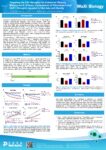Targeting the CB1 Receptor for Enhanced Obesity Management

Obesity is a significant risk factor for developing conditions like type 2 diabetes, heart disease, stroke, and several types of cancer. The cannabinoid-1 (CB1) receptor plays a significant role in regulating energy homeostasis, including appetite, food intake, and metabolism, and this receptor is emerging as a promising target for the treatment of obesity. Although rimonabant, a CB1 receptor antagonist, was withdrawn from the market due to psychiatric side effects, the strategy of targeting the CB1 receptor remains promising.
At the 32nd European Congress on Obesity, WuXi Biology presented a poster comparing the efficacy of rimonabant with that of a GLP-1 receptor agonist (semaglutide) in reducing body weight, altering body composition, and improving other metabolic parameters using a diet-induced obesity (DIO) mouse model. The authors show that rimonabant outperformed semaglutide in reducing body weight and key metabolic parameters, suggesting that the development of next-generation CB1 antagonists with enhanced safety profiles could offer a promising avenue for advancing obesity therapeutics.

ECO Poster_Targeting the CB1 Receptor for Enhanced Obesity Management
Related Content
Metabolic dysfunction-associated steatohepatitis (MASH), previously known as nonalcoholic steatohepatitis (NASH), is a serious liver disease. If left untreated, MASH can...
VIEW RESOURCEIntroduction: OncoWuXi Express will continue to keep you informed about updates to our online pharmacology model database (OncoWuXi Database), as...
VIEW RESOURCE
